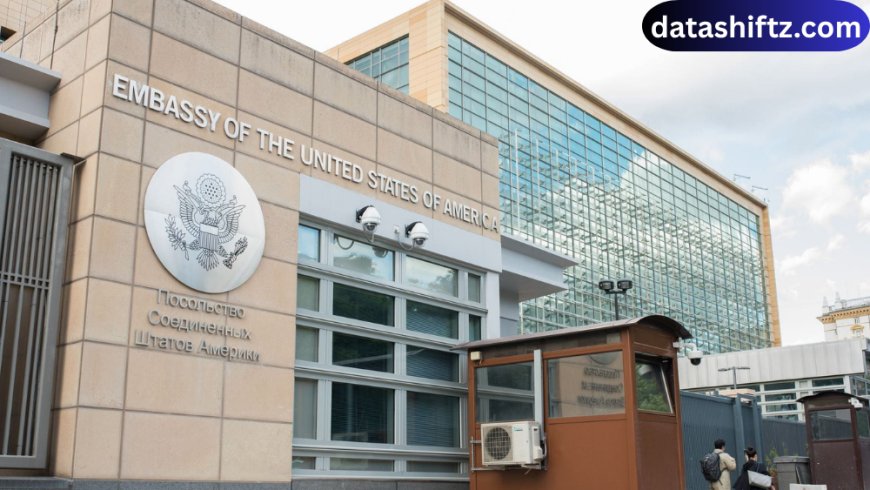US Embassy Shutdown: Causes, Consequences, and Global Impact

Introduction
The US embassy shutdown is a rare but highly impactful event that can disrupt diplomacy, trade, travel, and security operations worldwide. Embassies are the lifeline of international relations, serving as centers for visa processing, diplomatic negotiations, and emergency support for citizens abroad. When these institutions shut down—either temporarily or indefinitely—it raises questions about security, political tensions, and the balance of power in global diplomacy.
A US embassy shutdown does not simply affect Americans living overseas but also has ripple effects on the host country, impacting visa applicants, businesses, and bilateral relations. Whether caused by political disagreements, budget crises, or security threats, such shutdowns underscore the fragile yet crucial role embassies play in maintaining global connectivity.
This article provides an in-depth analysis of why US embassies shut down, their immediate and long-term consequences, and the broader implications for international diplomacy.
Why Do US Embassies Shut Down?
Embassy shutdowns are not routine; they usually occur under exceptional circumstances. The main reasons include:
-
Security Threats – Terrorism, violent protests, or threats against diplomats often force temporary shutdowns.
-
Political Tensions – Host countries in conflict with US policies may create an environment unsafe for diplomatic operations.
-
Government Shutdowns in the US – Federal budget impasses sometimes reduce embassy staff and services abroad.
-
Pandemics or Natural Disasters – Events like COVID-19 forced closures of many embassies and consulates globally.
-
Administrative or Policy Shifts – Certain closures happen when diplomatic strategies change.
Historical Background of Embassy Shutdowns
Throughout history, several incidents have highlighted the vulnerability of US embassies:
-
Tehran, 1979 – The Iran hostage crisis led to the closure of the US embassy in Iran, which remains shut to this day.
-
Libya, 2014 – Embassy staff were evacuated due to civil war and escalating violence.
-
Yemen, 2015 – Operations ceased because of deteriorating security conditions.
-
COVID-19 Pandemic (2020–2021) – Multiple embassies and consulates operated at limited capacity or closed temporarily.
These events illustrate how global crises directly impact diplomatic missions and American citizens abroad.
Effects of a US Embassy Shutdown
1. Impact on Citizens Abroad
American citizens depend on embassies for passports, emergency evacuations, and legal aid. A shutdown leaves them vulnerable during crises.
2. Visa and Immigration Services
Embassy closures delay visa processing for students, workers, and tourists. This affects international mobility and damages bilateral relations.
3. Diplomatic Relations
Shutting down an embassy signals strained relations with the host country, sometimes escalating conflicts further.
4. Trade and Economic Impact
Businesses depending on US partnerships face delays in negotiations, investment approvals, and trade facilitation.
5. Global Security
The absence of embassy intelligence networks reduces the US’s ability to monitor security threats in key regions.
US Embassy Shutdown
| Factor | Description |
|---|---|
| Main Causes | Security threats, political tensions, US government shutdown, pandemics |
| Historical Examples | Iran (1979), Libya (2014), Yemen (2015), COVID-19 global closures |
| Direct Impact | Citizens abroad, visa applicants, diplomatic staff |
| Economic Consequences | Trade disruption, delayed business deals, tourism decline |
| Security Implications | Reduced intelligence, weaker counterterrorism coordination |
| Duration | Temporary (weeks/months) or indefinite depending on situation |
| Alternative Measures | Virtual services, third-country embassies, limited staff operations |
Advantages of Embassy Shutdowns
While largely negative, some shutdowns serve strategic or protective purposes:
-
Protects American diplomats and staff during violent situations.
-
Prevents misuse of embassy resources during crises.
-
Sends a strong diplomatic signal to hostile governments.
-
Allows reassessment of US policies in unstable regions.
-
Encourages alternative international arrangements.
-
Reduces risks of hostage-taking or terrorist attacks.
-
Aligns with broader US foreign policy strategies.
-
Provides time for evacuation of citizens safely.
-
Saves resources during low-priority engagements.
-
Acts as a temporary pause before resuming stronger ties.
Disadvantages of Embassy Shutdowns
Despite protective benefits, shutdowns have multiple drawbacks:
-
Loss of trust with host countries.
-
Visa delays harming students, professionals, and businesses.
-
Reduction in American cultural and educational influence.
-
Negative impact on local economies that benefit from US partnerships.
-
Increased perception of instability in US foreign policy.
Broader Global Impact
-
Geopolitical Ramifications – Hostile powers may exploit embassy closures to strengthen their own influence.
-
Regional Instability – Reduced US presence affects balance of power, especially in volatile regions.
-
Humanitarian Gaps – Aid programs and emergency relief initiatives often stall during shutdowns.
-
Immigration Backlogs – Students and skilled workers face uncertainty, impacting innovation and education systems globally.
-
Military Cooperation – Shutdowns reduce intelligence-sharing with allies in combating terrorism and cyber threats.
Case Study: The COVID-19 Embassy Shutdowns
The pandemic created unprecedented global closures of US embassies. Visa processing halted in many countries, leading to massive delays for students and H1-B workers. These disruptions revealed how deeply intertwined embassies are with global mobility and economic exchange. It also highlighted the need for digital platforms in consular services.
Future of US Embassy Operations
With globalization and security challenges, embassies are evolving:
-
Digital Diplomacy: Online platforms for visa processing and citizen support.
-
Enhanced Security: Stronger physical protections and advanced intelligence.
-
Regional Hubs: Using neighboring countries’ embassies for backup operations.
-
Hybrid Models: Combining physical presence with virtual services to reduce shutdown risks.
If adopted effectively, these innovations may prevent complete shutdowns in the future.
Conclusion
A US embassy shutdown is more than a temporary closure—it is a signal of deeper political, economic, and security issues. While shutdowns serve as protective measures for diplomats and citizens, their impact on global mobility, trade, and diplomacy is profound. From stranded students to delayed business deals, the consequences ripple across nations.
For the US, balancing security with continuity of services remains a major challenge. The future of diplomacy may depend on adopting hybrid solutions like digital consular services and regional cooperation to reduce dependence on physical embassies.





























